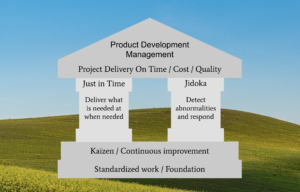
The Toyota Production System (TPS) is known for its principles of efficiency, quality, and continuous improvement principles. At its core is the foundation of Standardized Work, with pillars of Just-In-Time (JIT) production and Jidoka (autonomation: detect abnormalities and respond), all under the roof of achieving the highest quality, the shortest lead time, and the lowest cost.
In New Product Development (NPD), TPS and NPD share similar goals: both strive for excellence in quality, efficiency, and cost-effectiveness. So how can we apply TPS principles to NPD?
The ShuHaRi process serves as a bridge, providing a systematic approach to applying TPS principles in NPD. Standardized work in ShuHaRi defines project phases and tasks, ensuring consistency and efficiency across functions. JIT is achieved as phase tasks are delivered according to a defined timing, aligning with project milestones.
To ensure quality and timely problem detection, ShuHaRi advocates for a layered audit approach, called “Trust but Verify.” The first layer is regular reviews by the task owner and the task owner’s direct manager. The second layer is a phase exit review with senior management. This high-level review reinforces the importance of the process and fosters a culture of accountability and excellence within the team.
By adopting TPS principles through the ShuHaRi process and system, NPD teams can streamline workflows, enhance collaboration, and achieve early detection and resolution of problems. The result? Improved product quality, reduced time-to-market, and optimized costs – a testament to the transformative power of TPS in NPD.
In conclusion, TPS principles can indeed be applied to New Product Development, and the ShuHaRi process and system serve as the conduit to make it happen. With easy access to project data and a structured approach to problem-solving, the ShuHaRi system helps the NPD team confidently apply TPS principles and drive innovation forward.
